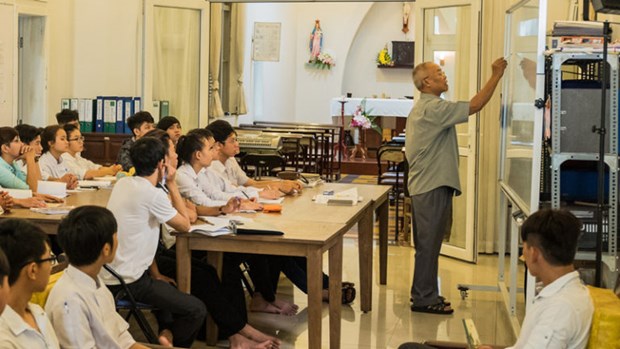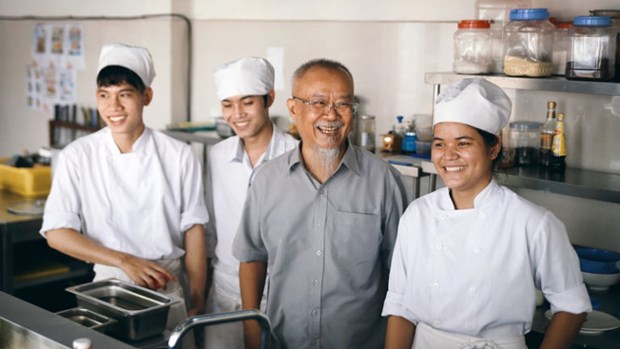“As a child, I always scolded my mother. Every
meal was the same: cooked fish, cooked vegetables, cooked rice. And that in a
fruitful country like Vietnam, so rich in natural ingredients!”
The
native of Vietnam spent 35 years in Germany before he came back to open the
Saigon-based not-for-profit organisation in 2014 that trains underprivileged
young people to be professional waiters, cooks and bakers.
Almost
40 years earlier, in January 1976, he set foot in Germany. He was a destitute
22-year-old with little hope for the future, stranded in a small town in the
south of the country called Murnau. “As a refugee, I didn’t have a work permit.
My only chance to survive was black labour. And where do you do that in
Germany? In gastronomy. So I ended up in a damp cellar of a Bavarian tavern,
washing dishes and salad.”
Three
years later, his legal status changed. So he scraped money together for another
two years to do a traineeship in cooking. This was the starting point of a
roaring career in the food and beverage industry.
His
early beginnings instilled a profound fondness for the German educational
system: “I didn’t have a penny, but I ended up as a successful chef. This is
something that impressed me over there. Trainees get paid, they’re independent.
So I told myself: ‘If we’d bring this system to Vietnam, then we’d give young
Vietnamese similar chances.’ This is how I got the idea to found Mai Sen.”
All you need is
confidence
At
his school, trainees learn the hospitality ropes for three years, not only at
Mai Sen’s own German restaurant in Binh Thanh District, but also during a
one-year internship at one of several partnering 5-star hotels: Le Méridien,
InterContinental, Park Hyatt, Caravelle, The Reverie… the list reads like a
who’s-who of Saigon’s hospitality sector.
The
traineeship ends with an exam conducted in English by the German Chamber of
Industry and Commerce. The whole curriculum follows Germany’s high standards.
When the young Vietnamese graduate from Mai Sen, they are ready for the big,
wide world.

Image source: Mai Sen
Mai
Sen receives far more applications than it can accept, but not all would-be
trainees get the full support from their families.
“When
a trainee comes here with the objective to become a cook or a waiter,” Francis
says, “the parents often say: ‘Others go to the big city and study engineering
or finance—and you want to be a cook?!’”
But
when they visit and see that their children are trained in noble 5-star
establishments, their eyes grow wider: “You work here?” This gives students
something they’re often lacking: confidence.
These
disadvantaged young people have all been brought up in poor circumstances.
“They feel stupid, like punished by God, they’ve accepted poverty as their
fate,” Francis describes. “This is a real inferiority complex.” Self-esteem
might be the single most valuable thing Mai Sen teaches them.
Minh,
Mai Sen’s shift leader, is living proof of this. He’s one of the first 21
graduates, and now provides training to young students. As his family couldn’t
support him to go to college, he joined the vocational school in Saigon.

When
asked about Mai Sen and its principal, his eyes sparkle: “Francis is our
teacher and also more than that. He changed my mind, he gave me a job and not
only a job, but a future.”
Barkeeper
Ngan, who’s also a dessert expert (ask her for a cup of panna cotta!), seconds
him: “Mai Sen has changed my life,” she states. ”I never planned to work in
hospitality, but when I came here, I started to see that this is just the right
thing for me.”
Rosy Prospects
Would
Francis recommend his trainees to follow his path to Germany? “They’re free to
do whatever they want, but no, I wouldn’t recommend them that. Germany has
enough skilled workers. We need them here more urgently.”
He
sees a lot of untapped potential in Vietnam’s hospitality sector. Well-trained
gastronomic labour remains a rare commodity, and his graduates obtain an
internationally recognised degree. “In the next 50 years, none of them will
have to be worried about their job.”
Source: citypassguide.com